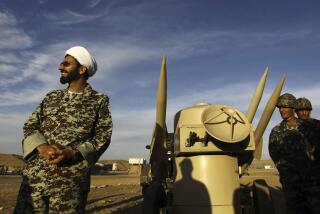Iraqi Arms Dispute Still at a Slow Boil
- Share via
UNITED NATIONS — There was fresh evidence Tuesday that, despite a superficial calm, the dispute over U.N. weapons inspections in Iraq continues to churn just beneath the surface--leaving open the prospect of renewed confrontation between Washington and Baghdad.
It came packaged in a contradictory exchange between Mohammed Said Sahaf, Iraq’s foreign minister, and Richard Butler, the U.N.’s chief weapons inspector, in back-to-back news conferences at U.N. headquarters.
An angry, indignant Sahaf excoriated the Security Council for refusing Monday to immediately lift economic sanctions against Baghdad and repeated earlier assertions that the Iraqi government eliminated its weapons of mass destruction in 1991.
Less than two hours later, Butler was describing the recent recovery and disarming of mustard gas artillery shells that the Iraqis had said were destroyed in the Persian Gulf War. These are just the kind of weapons the inspectors are hunting, despite Iraqi claims they don’t exist.
The conflict illustrates the mutual frustration and gap in perception affecting the Iraqi government and the U.N. just two months after U.N. Secretary-General Kofi Annan reached agreement with Iraqi President Saddam Hussein, supposedly ensuring complete Iraqi cooperation with the inspectors. The accord averted a planned strike on Iraq by U.S. and British aircraft, although the planes remain in attack position.
In the weeks since, the U.S. has muted its criticism of Iraq here and for the first time expressed a willingness to acknowledge Iraqi cooperation in some areas. The U.S., however, continues to oppose any easing of sanctions or loosening of the inspection program.
Butler also stressed that the Iraqis have shown “an entirely new spirit of cooperation” since the Feb. 22 agreement with Annan. But he acknowledged that Iraq still has not provided the full information needed to confirm Baghdad’s claims that it no longer has chemical and biological weapons and long-range missiles. “It’s against the rules for us to believe it just because you say it,” he said. “You have to give us the material to verify it.”
Moreover, members of Butler’s team privately express skepticism about Iraq’s long-term willingness to uphold its end of the bargain with Annan. Sahaf reinforced that view Tuesday when he suggested that Iraq might cut off access by weapons inspectors to eight Iraqi “presidential” compounds at the center of the Annan-Hussein deal.
Annan repeatedly has said the agreement with Hussein guarantees inspectors access to presidential sites without conditions or limits. But Sahaf, as other Iraqi officials have, hedged Tuesday. He said the accord calls for an initial and subsequent visits but not open-ended access. “They will not go there as an ordinary disarmament procedure,” he said.
If the Iraqis do close the compounds to inspection, that could reignite the crisis with the U.S., which would consider it a breach of the agreement with Annan.
Under the cease-fire that ended the 1991 Gulf War, Butler’s inspectors must certify that Iraq has eliminated its chemical, biological and nuclear weapons capacity and its long-range missiles before the Security Council can end the crippling sanctions.
Although the inspectors have said Iraq appears to have ended its atomic weapons research, they also say there are still remnants of chemical, biological and missile programs. As a result, the council on Monday unanimously rejected, without a formal vote, any reduction in the sanctions.
Sahaf said that decision was “very disappointing” and repeated Iraqi assertions that Baghdad long ago disposed of its weapons of mass destruction. “The disarmament process in Iraq is completed,” he said. “There is nothing in Iraq.”
But Butler described the unearthing of live chemical weapons shells as an example of the problems his inspectors have had in verifying such claims. The 155-millimeter artillery rounds filled with mustard gas recently were excavated from an ammunition depot where they were discovered by inspectors in 1996. The shells, the Iraqis have told the disarmament team, were among thousands of chemical munitions Iraq could not account for and probably lost in the Gulf War.
Iraq has resisted helping the U.N. track all these weapons, arguing that the gas inside them would have lost potency by now; to prove that claim inaccurate, inspectors removed and tested four of the shells in recent weeks and found the gas inside 94% to 97% pure. Armed with that information, the inspectors have renewed pleas to Iraqi Deputy Prime Minister Tarik Aziz for a fuller accounting of chemical weapons.
“We’re on the case,” Butler said, but he declined to describe the status of negotiations with Aziz. “I don’t want to discuss any problems in work in progress that might make it harder for them [the Iraqis] to do the right thing.”
More to Read
Sign up for Essential California
The most important California stories and recommendations in your inbox every morning.
You may occasionally receive promotional content from the Los Angeles Times.












